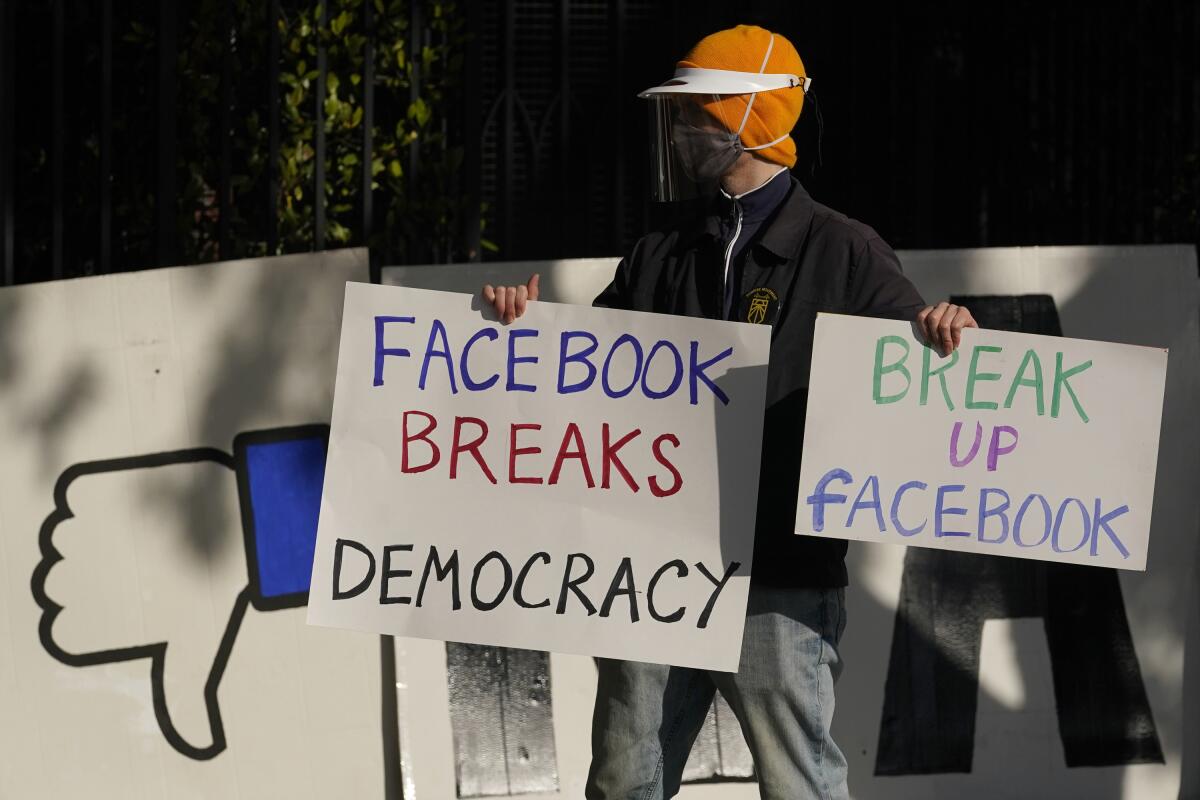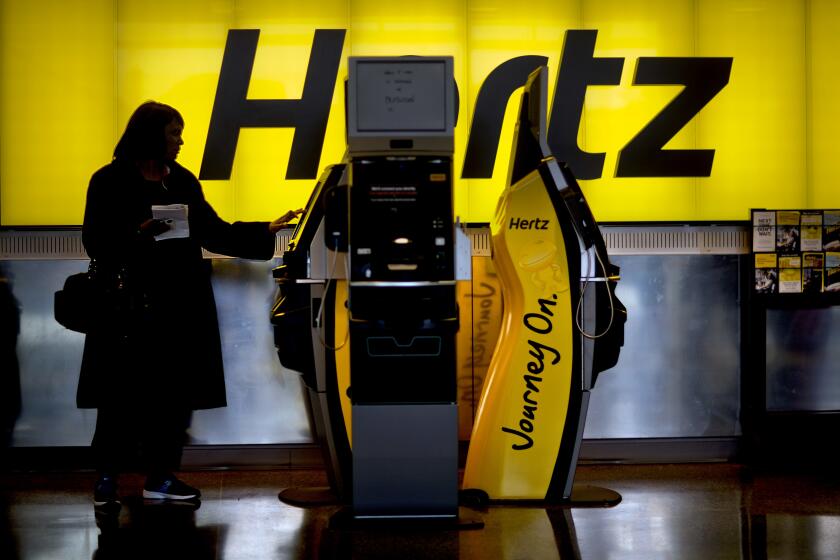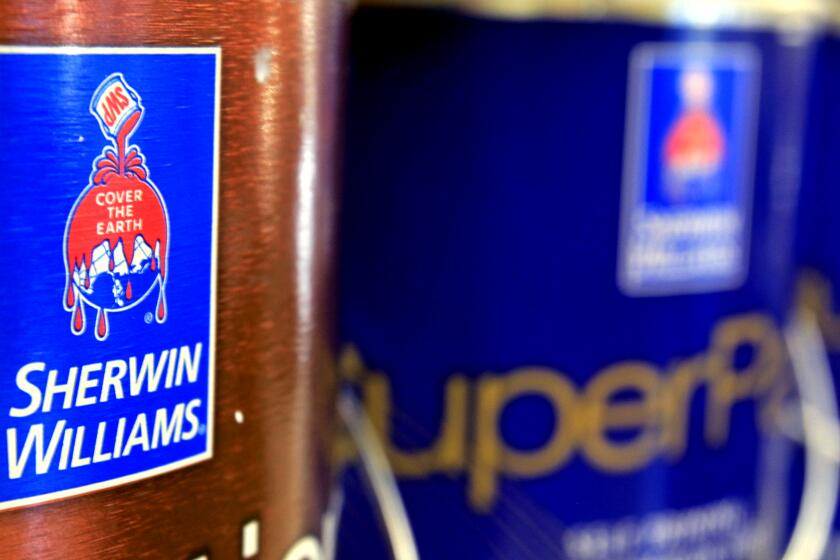Facebook, fooling no one, may be going for a new name

- Share via
There are two things wrong with Facebook’s reported plan for a name change that better reflects its role in the high-tech “metaverse.”
First, the metaverse? Seriously?
Second, who do they think they’re fooling?
It’s still Facebook, for goodness sake, that monstrous, monopolistic company that wants to undermine your privacy at every turn, spread lies and, Big Tobacco-style, hook young people for life on its digital products.
“Consumers are not stupid,” said Jan-Benedict Steenkamp, a marketing professor who specializes in branding at the University of North Carolina at Chapel Hill.
By which he means Facebook’s nearly 3 billion users worldwide are well aware of the seemingly endless controversies — the privacy issues, the misinformation, the turning a blind eye to hate speech, racism and political dishonesty.
“The only way for Facebook to move beyond its controversies is to radically clean up its act,” Steenkamp told me. “And anyway, even if Facebook does change its corporate name, its main product would still be called Facebook.”
An L.A. man can prove he was on a plane awaiting takeoff when Hertz says he returned his rental car. Nevertheless, Hertz imposed a late fee.
The Verge, a tech website, reported Wednesday that Facebook might announce a corporate name change as soon as next week, citing “a source with direct knowledge of the matter.”
The move “is meant to signal the tech giant’s ambition to be known for more than social media and all the ills that entail,” the Verge reported. Facebook declined to comment for the story.
While Facebook’s intentions remain unclear, the best guess among marketing experts is that the company will follow Google’s example and create an ambiguously named parent company to oversee its various operations.
These include the namesake social media platform, Instagram, WhatsApp and Oculus, Facebook’s virtual-reality system.
There’s speculation that Facebook will call the parent company Horizon to somehow capture a sense of, you know, broad technology horizons, a limitless future, whatever.
This is where the buzzy idea of the metaverse enters the picture. The phrase was coined by author Neal Stephenson in his 1992 sci-fi novel “Snow Crash.” Think of it as “cyberspace” — another phrase with sci-fi roots — on steroids.
If the parent company is called Horizon, the company’s various divisions, in turn, could be renamed “Horizon Facebook” or “Horizon Instagram” or variations thereof. Or they could remain unchanged.
And, of course, scandal-prone Facebook’s chief executive, Mark Zuckerberg, would no longer be the CEO of Facebook when he’s testifying before disgruntled lawmakers, as seems to be often the case.
He’d be the Horizon CEO, which in theory would insulate the core Facebook brand from whatever missteps he’s been called to account for. Or he’d no longer be the poor sap who has to answer for Facebook. The head of the division would be in the hot seat.
That’s one possibility. Another is that the company actually may want to completely rechristen itself in hopes of leaving past problems behind and rebooting its corporate image.
Sherwin-Williams has quietly added a 4% ‘supply chain charge’ to its paint. It’s the latest business to hide a price hike with extra fees.
“It’s critical for Facebook to get the next generation hooked on its technology,” said Barbara E. Kahn, a marketing professor at the University of Pennsylvania.
“The big issue for young people is that Facebook is Granny’s platform, your parents’ platform,” she told me. “They need to get away from that.”
A new corporate identity, Kahn observed, would have the dual benefits of turning the page on past scandals and repositioning the company in the digital marketplace as a cooler, fresher product.
“They need to get people to think about the brand in a different way,” she said.
We’ve seen this many times before. Perhaps the most prominent example of a company trying to reinvent itself by changing its corporate clothes was when tobacco giant Philip Morris renamed itself Altria Group in 2003.
The company said the switch better reflected its portfolio of businesses. But it wasn’t kidding anyone. The Philip Morris brand had grown toxic after endless tobacco controversies.
The Altria brand, meanwhile, was pristine. So the company called itself that — and kept on selling cigarettes.
We’ve seen this over and over. Andersen Consulting (with ties to auditor Arthur Andersen of Enron fame) changed its name to Accenture. ValuJet Airlines, which was grounded in 1996 after a crash that killed all 110 people aboard, changed its name to AirTran Airways.
Sales of bottled water have soared during the pandemic. Many Americans may not realize they’re just paying a huge markup for tap water.
“Changing a brand name entirely is not a common occurrence,” said Richard J. Lutz, a marketing professor at the University of Florida.
“It is expensive,” he said. “When companies do that, it is usually due to the desire — or pressing need — to distance themselves from unwanted associations.”
He cited recent name changes for troubled, racially tinged brands such as Aunt Jemima and Uncle Ben’s.
Facebook, if the name-change reports are correct, would merely be following in this grand tradition of announcing to the world that all’s well because, um, there’s a new name on the door.
“It would allow them to refresh themselves,” said Matthew Quint, a director of the Center on Global Brand Leadership at Columbia University.
“It would allow them to show that they see a future of different technologies, all swarming together,” he said.
Yeah, OK. Swarming technologies. Got it.
But there’s probably a more practical motive at work here.
“Yes, they need to distance themselves a bit from the Facebook brand,” said Timothy Calkins, a marketing professor at Northwestern University’s Kellogg School of Management.
“But what this really would do is tell investors and employees that things are different,” he said. “Corporate branding really matters most at that level.”
It also perhaps would help with recruiting new talent. Up-and-coming coders who might not want to work for Facebook could be more amenable to the idea of working for Horizon.
But, at root, it’s still Facebook.
Coffee prices, and food costs in general, are rising because of climate change. For consumers, that’s a good reason to take this problem seriously.
And Facebook is still a corporate behemoth that has demonstrated time and again that it cares far more about profit than it does about safeguarding its billions of users.
It can call itself Horizon if it wants. Heck, it can call itself World Peace, or Puppies and Kittens.
Until the company makes meaningful changes, it’s still not to be trusted.
More to Read
Inside the business of entertainment
The Wide Shot brings you news, analysis and insights on everything from streaming wars to production — and what it all means for the future.
You may occasionally receive promotional content from the Los Angeles Times.














